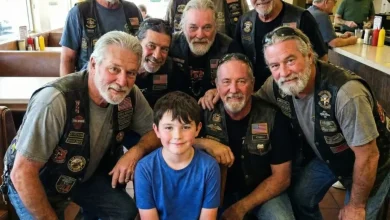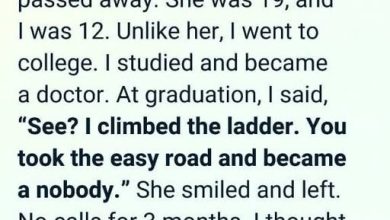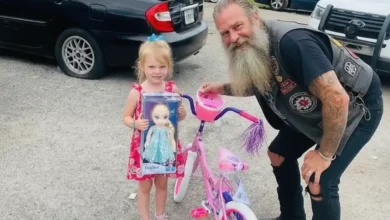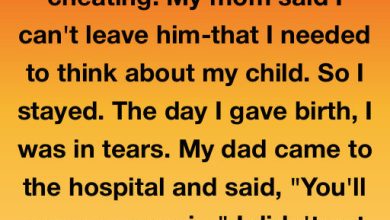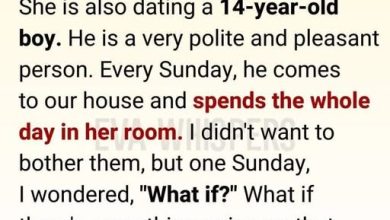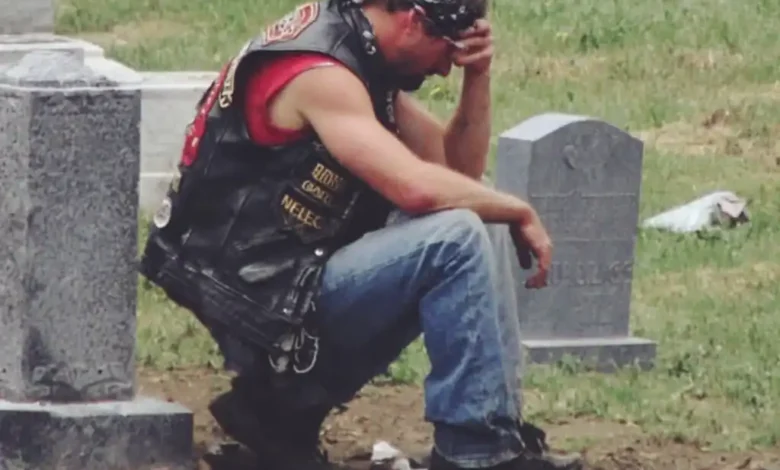
A Biker Showed Up At My Wife’s Grave Every Week And I Had No Idea Who He Was
A biker showed up at my wife’s grave every week and I had no idea who he was. For six months I watched him from my car. Same day. Same time.
Every Saturday at 2 PM he’d roll up on his Harley, walk to Sarah’s headstone, and sit there for exactly one hour.
He never brought flowers. Never said a word that I could see. Just sat cross-legged on the ground next to her grave with his head bowed.
The first time I saw him, I thought maybe he had the wrong grave. The cemetery’s big. People get confused. But he came back the next week. And the next. And the next.
I started getting angry. Who was this guy? How did he know my wife? Why was he spending an hour every single week at her grave when some of her own family couldn’t be bothered to visit once a month?
Sarah died fourteen months ago. Breast cancer. She was forty-three. We’d been married twenty years. Two kids. A good life. A normal life.
There was nothing in her past that would connect her to a biker. She was a pediatric nurse. She volunteered at church. She drove a minivan. Her idea of rebellion was putting an extra shot of espresso in her latte.
But this guy, this biker, he was grieving her like he’d lost someone precious. I could see it in the way his shoulders shook sometimes. In the way he’d press his hand against her headstone before he left.
It was driving me crazy. After three months, I couldn’t take it anymore. I got out of my car and walked over while he was there.
He heard me coming. Didn’t turn around. Just kept his hand on Sarah’s headstone.
“Excuse me,” I said. My voice came out harder than I meant it to. “I’m Sarah’s husband. Mind telling me who you are?”
He was quiet for a long moment. Then he stood up slowly. He was big. Maybe six-foot-four, three hundred pounds. Beard down to his chest. Tattoos covering his arms. He looked exactly like the kind of guy Sarah would’ve crossed the street to avoid.
But his eyes were red. He’d been crying.
“I’m sorry,” he said quietly. “I didn’t mean to intrude. I just needed to say thank you.”
“Thank you for what?”
He looked at Sarah’s headstone. Then back at me. “Your wife saved my daughter’s life. I come here to tell her that Kaylee’s still alive because of what she did.”
I stared at him. “I don’t understand. Sarah never mentioned knowing anyone with a daughter named Kaylee.”
“She didn’t know her personally. She probably didn’t even remember it.” He wiped his eyes. “Can I tell you what happened? You deserve to know.”
We sat down right there. Me on one side of Sarah’s grave. Him on the other. And he told me a story that broke my heart and put it back together at the same time.
His name was Mike. Forty-seven years old. Mechanic. He had a daughter, Kaylee, who was diagnosed with leukemia when she was nine years old.
“The treatment was expensive,” he said. “Insurance covered some of it, but we had co-pays and deductibles and all this other stuff that added up fast. I was working eighty hours a week. My wife was working two jobs. We sold our house. Sold everything we could. But it wasn’t enough.”
They were $40,000 short of being able to continue Kaylee’s treatment. The hospital said they’d work with them, but “work with them” meant payment plans that would take decades. Meanwhile, Kaylee needed treatment immediately.
“I started asking everyone I knew for help. Family. Friends. My motorcycle club did fundraisers. We raised about $8,000. Nowhere near enough.” His voice cracked. “I was losing my mind. My baby girl was dying and I couldn’t save her because I didn’t have money.”
One day Mike was at the hospital with Kaylee. She was getting treatment. He was in the hallway trying not to cry where she could see him. Sarah was working that day. She wasn’t even Kaylee’s nurse, but she saw Mike breaking down.
“She asked if I was okay. I lost it. Told her everything. Told her I was about to lose my daughter because I was a failure who couldn’t come up with $40,000.” He shook his head. “Your wife listened to everything. She didn’t judge me. Didn’t look at me like I was some scary biker. She just listened.”
Then Sarah said something Mike would never forget: “Sometimes miracles happen. Don’t give up hope.”
Two days later, the hospital called Mike and his wife. There had been an “administrative error.” Someone had anonymously paid Kaylee’s remaining treatment costs in full. All $40,000. The hospital said they couldn’t reveal who the donor was, but all of Kaylee’s treatment was now covered.
“We were in shock,” Mike said. “We couldn’t believe it. We asked everyone. Called the hospital fifty times trying to find out who did it. They wouldn’t tell us. Said the donor specifically requested to remain anonymous.”
Kaylee completed her treatment. She responded well. She went into remission. Three years later, she was declared cancer-free.
“We spent years trying to find out who saved her,” Mike said. “Years. It was like trying to find a ghost.”
Then, six months ago, Mike was going through some old paperwork from the hospital. He found a receipt he’d never noticed before. It had a reference number on it.
He called the hospital’s billing department. Explained he was trying to find the donor who’d saved his daughter’s life years ago. The person on the phone said they couldn’t give out that information. But Mike pushed. Begged. Explained his daughter was alive because of this person and he just wanted to say thank you.
Finally, the billing clerk made a mistake. She said, “I really can’t give you her information, sir. I’m sorry.”
Her. It was a woman.
Mike pushed more. The clerk, flustered, said she couldn’t say anything else and hung up. But Mike had a first name from the payment reference code: Sarah.
He started researching. Found out which nurses had worked at the hospital that day. There were three Sarahs. One had moved to California. One had retired and was traveling the country. The third was Sarah Patterson. My wife.
“I found her social media. Saw photos of her with her family. With you. With your kids.” Mike’s voice was shaking. “I recognized her immediately. She was the nurse who talked to me in the hallway that day. The one who said don’t give up hope.”
He tried to reach out to her. Sent her a Facebook message. It sat unread for weeks. Then he sent another. And another. He just wanted to say thank you. Wanted her to know that Kaylee was alive and thriving and it was all because of what she’d done.
Then he found out why she wasn’t responding. Her obituary popped up in a Google search. Sarah Patterson, 43, died of breast cancer. Survived by her husband and two children.
“I broke down right there at my computer,” Mike said. “The woman who saved my daughter’s life was gone. And I never got to thank her.”
So he started coming to her grave. Every Saturday. Same time. He’d sit with her and tell her about Kaylee. Tell her about the girl she saved.
“Kaylee’s sixteen now,” he said. “She’s on the honor roll. She wants to be a doctor. She’s alive and beautiful and everything a dad could hope for.” Tears were streaming down his face. “And it’s because your wife gave $40,000 to a stranger. To some biker she didn’t know. She saw a father begging for help and she helped him.”
I was crying too. Hard. Because I never knew. Sarah never told me. We had $40,000 saved up fifteen years ago. It was supposed to be for a kitchen renovation. Sarah said she’d spent it on “something important” but wouldn’t give me details. We had a huge fight about it.
I was so angry. I accused her of being irresponsible. Of making major financial decisions without consulting me. She just said, “I did what I had to do. You’ll understand someday.”
I never understood. Until now.
“I’m sorry I’ve been coming here without introducing myself,” Mike said. “I just needed her to know that what she did mattered. That it changed everything.”
I couldn’t speak. Just shook my head. Mike stood up.
“I’ll stop coming if it bothers you,” he said. “This is your family’s space. I don’t want to intrude.”
“No,” I said quickly. “Please keep coming. She’d want that. She’d want to know about Kaylee.”
Mike nodded. Walked back to his bike. Then he turned around.
“Your wife was one of the best people I’ve ever met. And I only talked to her for five minutes. That tells you everything about who she was.”
He rode away. I sat there for another hour. Just talking to Sarah. Telling her I was sorry for being angry. Telling her I finally understood.
The next Saturday, I went back to the cemetery at 2 PM. Mike was already there. I brought two lawn chairs. We sat together. And he told me all about Kaylee. About her dreams. About how she volunteers at the children’s hospital now. About how she wants to help kids the way she was helped.
This has been going on for six months now. Every Saturday. Me and Mike. Sitting with Sarah. Sometimes we talk. Sometimes we just sit in silence.
Last week, Mike brought Kaylee with him. She’s beautiful. Healthy. Alive. She put flowers on Sarah’s grave and cried.
“Thank you for saving me,” she whispered. “I won’t waste the life you gave me.”
Mike’s not just some random biker anymore. He’s family. He checks on my kids. Helped my son fix his car. Brought groceries when I was too depressed to go shopping. His wife bakes cookies for my daughter.
We’re tied together now. By Sarah. By sacrifice. By love. People at the cemetery probably think it’s weird. The widow and the biker sitting together at a grave every Saturday. Let them think whatever they want.
I know the truth. My wife gave everything to save a stranger’s child. And that stranger has been honoring her memory every single week since he found out she was gone.
That’s not weird. That’s beautiful.
That’s exactly who Sarah was. And I’m going to make sure everyone knows it.
